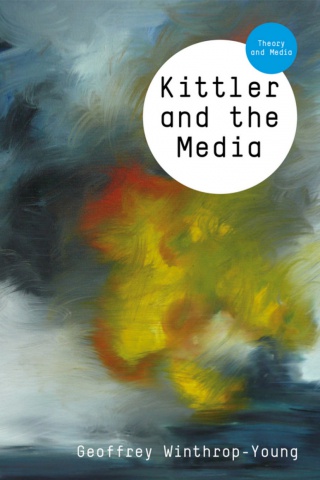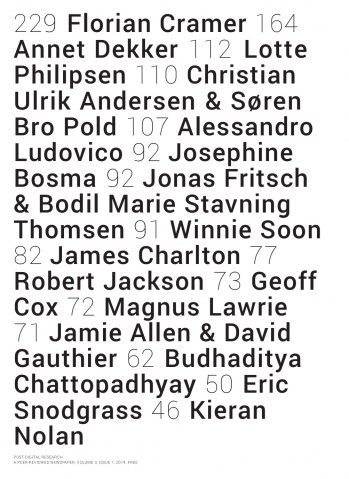Geoffrey Winthrop-Young: Kittler and the Media (2011)
Filed under book | Tags: · alphabet, biography, computing, cultural techniques, discourse, language, media, media technology, media theory, philosophy, technology

“With books such as Discourse Networks and Gramophone, Film, Typewriter and the collection Literature, Media, Information Systems, Friedrich Kittler has established himself as one of the world’s most influential media theorists. He is also one of the most controversial and misunderstood.
Kittler and the Media offers students of media theory an introduction to Kittler’s basic ideas. Following an introduction that situates Kittler’s work against the tumultuous background of German 20th-century history (from the Second World War and the cultural upheaval of the late 1960s to reunification), the book provides succinct summaries of Kittler’s early discourse-analytical work inspired by French post-structuralism, his media-related theorising and his most recent writings on cultural techniques and the notation systems of Ancient Greece.
This clear and engaging overview of a fascinating theorist will be welcomed by students and scholars alike of media, communication and cultural studies.”
Publisher Polity, 2011
Theory and Media series
ISBN 0745644066, 9780745644066
165 pages
PDF (updated on 2019-12-8)
Comments (6)A Peer-Reviewed Journal About, 3(1): Post-Digital Research (2014)
Filed under journal | Tags: · aesthetics, media, media theory, postdigital, publishing, research

“This issue of the journal addresses the messy and paradoxical condition of art and media after digital technology revolutions and critically reflects on the term “post-digital”. The issue is the outcome of a process where a number of researchers, artist-researchers and Ph.D.’s have collaborated in presenting and exchanging ideas around the subject. This follows an earlier call from transmediale festival, Berlin, and a research event at Kunsthal Aarhus. The issue does not present a uniform interpretation of the notion, but includes a variety of positions related to the use of the term, its application within various fields, and how it is reflected in artistic research.”
With contributions by Jamie Allen, Christian Ulrik Andersen, Josephine Bosma, James Charlton, Budhaditya Chattopadhyay, Geoff Cox, Florian Cramer, Annet Dekker, Jonas Fritsch, David Gauthier, Robert Jackson, Magnus Lawrie, Alessandro Ludovico, Kieran Nolan, Lotte Philipsen, Søren Pold, Eric Snodgrass, Bodil Marie Stavning Thomsen and Winnie Soon.
Edited by Christian Ulrik Andersen, Geoff Cox and Georgios Papadopoulos
Publisher Digital Aesthetics Research Center, Aarhus University, Aarhus, in collaboration with reSource transmedial culture Berlin/transmediale, Berlin, Jun 2014
Creative Commons Attribution-NonCommercial-ShareAlike license
ISSN 2245-7755
HTML (updated on 2021-5-4)
PDFs (updated on 2021-5-4)
PDF (44 MB)
Letters of Marshall McLuhan (1987)
Filed under book | Tags: · biography, communication technology, language, literary theory, mass media, media, media theory, print, technology, television

McLuhan corresponded with a vast number of people, including Duke Ellington, Woody Allen, Jacques Maritain, Rollo May, Susan Sontag, Eugene Ionesco, Wyndham Lewis, Ezra Pound, Bob Newhart, Hubert Humphrey and Jimmy Carter.
Heavily annotated, the letters are arranged in three sections, each with a period introduction: 1931-1936 takes McLuhan through the University of Manitoba and Cambridge University. 1936-1946 covers one year’s teaching at the University of Wisconsin; two years at Saint Louis University; one year, with his bride, at Cambridge for work on his Ph.D.; four more years at Saint Louis; and two years as Assumption College, Windsor, Ontario. These letters include a large correspondence with Wyndham Lewis. The last section begins in 1946, when McLuhan went to the University of Toronto. Two years later he began a long correspondence with Ezra Pound. Covering the period of McLuhan’s fame, it ends in September 1979 with a letter to Pierre Elliott Trudeau, written shortly before McLuhan had a stroke that rendered him speechless.
These letters have been selected from a large collection, now in the Public Archives of Canada, and offer a valuable commentary on McLuhan’s work and, in some instances, the most lucid and detailed explanation of his ideas available.
Selected and edited by Matie Molinam, Corrine McLuhan, and William Toye
Publisher Oxford University Press, 1987
ISBN 0195405943
562 pages
Review (R.D. Berg, Canadian Journal of Communication, 1988)
Review (Frank Kermode, London Review of Books, 1988)
PDF (189 MB, no OCR, any help in reducing the size is welcome!)
Comment (1)
